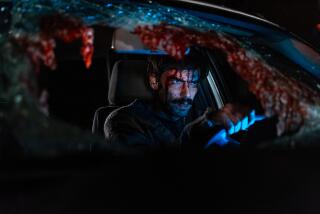A flicker of cinema spirits
- Share via
The American Cinematheque celebrates Halloween from Friday through Sunday at the Egyptian Theatre with “Black Cats and Haunted Castles: Classics of Japanese Horror and the Supernatural,” which features a number of cult items but kicks off with some major films by big directors.
The series opens Friday with a knockout double feature, Kaneto Shindo’s 1968 “Kuroneko” and Shiro Toyoda’s 1969 “Portrait of Hell.”
In the first, a horde of samurai descends upon a hut in a carefully tended field. They rape the two women there, eat their food supply and set fire to the thatched hovel, leaving their victims to be consumed in the flames. Only a pet cat survives.
All this seems to whisk by faster than it takes to describe, and the pace scarcely lets up in this eerie, allegorical ghost story. No sooner has the smoke from the charred embers cleared than there begins to appear at the nearby Rashomon Gate an exquisitely gowned lady (Kiwako Taichi) asking a samurai to escort her to her home in the bamboo forest, a request he should reject, no matter how ungallant.
“Portrait of Hell,” a fable set in the 10th century, emerges with stunning implications for today -- even touching on persistent prejudices of Japanese toward Koreans. Based upon a story by “Rashomon” author Ryunosuke Akutagawa, the film has been directed with flamboyant, bloody grandeur by Toyoda, one of the Japanese cinema’s past masters.
At a time of merciless oppression and exploitation by an absolute ruler, a Korean painter (Tatsuya Nakadai) whose only weapon is his brush dares to defy authority. Should Nakadai succeed in pleasing a despotic lord (Kinnosuke Nakamura) with his vast mural of hell, the artist’s daughter, held captive by the lord, will be returned to him.
A plot twist, however, involving her drives Nakadai to become as evil as his adversaries, which gives the film its strength and irony.
On Saturday, “Kwaidan,” a quartet of tales of the supernatural directed by Masaki Kobayashi, takes us into a strange and beautiful world in which the line between fantasy and reality blurs. This enthralling 1964 film, a Special Jury Prize winner at Cannes, weaves a spell of enchantment with its weird stories that unfold amid settings of surreal splendor in colors as breathtaking as that of 1954’s “Gate of Hell.” Like a series of ancient scrolls come to life, “Kwaidan” has many more scenes of poetic perfection than it is possible to describe.
Surrealist favorites
Along with Sergei M. Eisenstein’s “Battleship Potemkin” (1925), the New Beverly Cinema is screening tonight the Surrealist landmarks that launched Luis Bunuel’s career: the 18-minute “Un Chien Andalou” (An Andalusian Dog, 1928) and “L’Age d’Or” (The Golden Age, 1930), both written with Salvador Dali. “Un Chien Andalou” has been in general circulation for years, but “L’Age d’Or” surfaces less frequently.
The first, in which a series of bizarre incidents proceed as disconnected fragments in a dream, has one of the most notoriously unsettling images in cinema: a woman’s eye being slashed in half by a razor.
The second unfolds like a Freudian nightmare in its all-out attack on modern society. The vehement anticlericalism and mordant, anarchic humor permeating Bunuel’s work to the end of his life are in full force in “L’Age d’Or,” which begins with an outrageous parody of the founding of Rome. At this pompous, ceremonial occasion we meet a man (Gaston Modot) and a woman (Lya Lys) who fall passionately in love but are quickly separated for violating public decency. From then on, the obstacles placed in the path of the lovers’ reunion form a scathing indictment of the hypocrisies and evils of church and state.
A celebration of mad passion that dared to equate Christ and the Marquis de Sade, “L’Age d’Or” is no longer so shocking, yet it remains powerful and perplexing.
A vamp’s tale
Six years before Mae West dared to call her play “Sex,” Thomas Ince produced and Fred Niblo directed a 1920 film called “Sex,” starring pioneering screen vamp Louise Glaum as a New York cabaret star, the mistress of a married man. What gives the film its edge is that in truth she is simply a blunt, honest woman who doesn’t realize her own vulnerability. It screens Monday at the Silent Movie Theatre.
*
Screenings
Black Cats and Haunted Castles: Classics of Japanese Horror and the Supernatural
* “Kuroneko” and “Portrait of Hell,” 7:30 p.m. Friday
* “Kwaidan,” 5 p.m. Saturday
Where: Egyptian Theatre, 6712 Hollywood Blvd., Hollywood
Info: (323) 466-FILM or www.americancinematheque.com
New Beverly Cinema
* Luis Bunuel’s “Un Chien Andalou” and “L’Age d’Or,” with Sergei M. Eisenstein’s “Battleship Potemkin,” 7:30 tonight.
Where: 7165 W. Beverly Blvd., L.A.
Info: (323) 938-4038
Silent Movie Mondays
* “Sex,” 8 p.m. Monday
Where: Silent Movie Theatre, 611 N. Fairfax Ave., Hollywood
Info: (323) 655-2520
More to Read
The biggest entertainment stories
Get our big stories about Hollywood, film, television, music, arts, culture and more right in your inbox as soon as they publish.
You may occasionally receive promotional content from the Los Angeles Times.










